
Weather and Climate Dynamics
Scope & Guideline
Connecting Science and Society through Climate Research
Introduction
Aims and Scopes
- Atmospheric Dynamics and Convection:
Research exploring the mechanisms and dynamics of atmospheric convection, including deep convection, cyclogenesis, and storm track activities, with an emphasis on their roles in weather extremes. - Climate Change Impacts and Predictions:
Investigations into the effects of climate change on weather patterns, including changes in precipitation, temperature extremes, and the behavior of cyclones and other atmospheric phenomena. - Regional Climate Studies:
Focused studies on specific geographical areas, such as the Mediterranean, Arctic, and North Atlantic regions, analyzing local climate dynamics and their broader implications. - Modeling and Simulation Techniques:
Development and application of sophisticated modeling approaches, including high-resolution simulations and ensemble forecasting, to better understand atmospheric processes and improve predictive capabilities. - Teleconnections and Atmospheric Interactions:
Research on the connections between different atmospheric phenomena, such as the interactions between tropics and extratropics, and their implications for global climate variability.
Trending and Emerging
- Compound Weather Extremes:
Increasing attention is being paid to compound weather events, such as simultaneous heatwaves and heavy precipitation, as researchers seek to understand their dynamics and implications for risk management. - Stratosphere-Troposphere Interactions:
Research focusing on the interactions between the stratosphere and troposphere has gained momentum, particularly regarding how stratospheric events influence weather patterns and climate variability. - High-Resolution Climate Modeling:
There is a marked trend towards employing high-resolution climate models to capture local weather phenomena and their impacts more accurately, reflecting advancements in computational capabilities. - Impact of Climate Change on Weather Patterns:
A growing body of work is examining how climate change is altering traditional weather patterns, with a focus on understanding future risks and adaptation strategies. - Teleconnection Studies:
Research into atmospheric teleconnections—how weather in one part of the world influences conditions elsewhere—has become increasingly relevant, particularly in the context of global climate change.
Declining or Waning
- Traditional Cyclone Climatology:
Research focusing purely on the climatological aspects of cyclones without integrating broader dynamics or climate change implications has decreased, as the field moves towards a more dynamic understanding of cyclone interactions with climate change. - Static Weather Pattern Analysis:
Analyses that solely examine static weather patterns without considering their temporal variability or interactions with other climatic factors are becoming less common, reflecting a shift towards more dynamic and process-oriented studies. - Historical Weather Event Retrospectives:
While historical analyses of weather events remain relevant, there has been a decline in papers focused exclusively on retrospective studies without linking to current or future climate scenarios.
Similar Journals

Asia-Pacific Journal of Atmospheric Sciences
Advancing Knowledge in Meteorology and ClimatologyWelcome to the Asia-Pacific Journal of Atmospheric Sciences, a leading publication in the field of atmospheric science, published by the Korean Meteorological Society. With an ISSN of 1976-7633 and an E-ISSN of 1976-7951, this journal has been a cornerstone for researchers and practitioners in the atmospheric sciences since its inception in 2008. Recognized for its rigorous peer-reviewed articles, it holds a commendable Q2 quartile ranking in 2023 and is placed at the 51st rank out of 148 in the Earth and Planetary Sciences, reflecting its impact within the community with a 65th percentile. The journal features a broad scope encompassing meteorology, climatology, and environmental sciences, making it an essential resource for scholars and industry experts alike. As an open access journal, it ensures that groundbreaking research is widely accessible, fostering collaboration and innovation across the Asia-Pacific region and beyond. Explore the latest findings and advancements in atmospheric sciences and contribute to the dynamic field of climate research through the journal's engaging content.
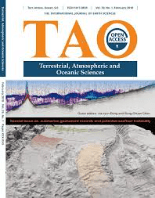
TERRESTRIAL ATMOSPHERIC AND OCEANIC SCIENCES
Championing Open Access for Global Scientific DialogueTERRESTRIAL ATMOSPHERIC AND OCEANIC SCIENCES, published by SpringerNature, is a distinguished peer-reviewed journal that has been an essential platform for innovative research in the fields of atmospheric science, oceanography, and Earth and planetary sciences since its inception. With an Open Access policy established in 1990, the journal ensures wide dissemination of knowledge, allowing researchers, professionals, and students to access cutting-edge findings without restrictions. Based in Switzerland and featuring a comprehensive coverage from 1996 to 2024, the journal currently holds a Q3 ranking across various categories, indicating its growing significance in the scientific community. Although it is positioned within the 39th percentile in Earth and Planetary Sciences, its commitment to fostering high-quality research makes it a valuable resource for advancing understanding of terrestrial environments and their interconnections. Researchers seeking a platform for their work in atmospheric and oceanic sciences will find TERRESTRIAL ATMOSPHERIC AND OCEANIC SCIENCES to be an ideal venue for sharing their insights with a global audience.

Journal of Tropical Meteorology
Deciphering the Dynamics of Tropical Weather SystemsJournal of Tropical Meteorology, published by JOURNAL OF TROPICAL METEOROLOGICAL PRESS, is a leading scholarly journal dedicated to advancing the understanding of atmospheric phenomena and meteorological patterns in tropical regions. With an ISSN of 1006-8775, this journal plays a vital role in disseminating high-quality research, focusing on critical issues such as climate variability, weather forecasting, and tropical cyclone dynamics. The journal, which is indexed in Scopus with a respectable rank in the low quartile of Q3 in Atmospheric Science, aims to provide a platform for researchers and professionals to share groundbreaking insights and foster collaboration within the scientific community. Although it follows a traditional access model, the Journal of Tropical Meteorology encourages submissions from a diverse range of disciplines, thus enriching the field with a variety of perspectives. By bridging theory and practical applications, this journal serves as an essential resource for students, researchers, and practitioners striving to expand their knowledge and contribute to the global conversation on meteorology.
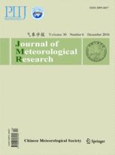
Journal of Meteorological Research
Your Gateway to Cutting-Edge Meteorological Insights.The Journal of Meteorological Research, published by SPRINGER HEIDELBERG, stands as a vital resource in the fields of Atmospheric Science and Ocean Engineering, boasting an impressive impact factor that reflects its scholarly significance. With its ISSN 2095-6037 and E-ISSN 2198-0934, the journal offers an open access platform, fostering accessibility and dissemination of cutting-edge research. Established in 2014 and running through to 2024, it is particularly distinguished in 2023 as Q2 in Atmospheric Science and Q1 in Ocean Engineering, underscoring its important contributions to these disciplines, with remarkable rankings in Scopus that place it in the top tiers of both categories. The journal accepts a broad range of research articles, reviews, and innovative methodologies, catering to a diverse audience of researchers, professionals, and students eager to advance their knowledge and expertise in meteorological studies. This makes the Journal of Meteorological Research an essential platform for anyone engaged in understanding and addressing the complex challenges of our changing climate.
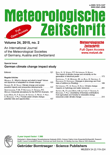
METEOROLOGISCHE ZEITSCHRIFT
Bridging Theory and Practice in Meteorological ScholarshipMETEOROLOGISCHE ZEITSCHRIFT is a distinguished academic journal dedicated to the field of meteorology and atmospheric sciences, published by E SCHWEIZERBARTSCHE VERLAGSBUCHHANDLUNG. With an ISSN of 0941-2948 and an E-ISSN of 1610-1227, this journal has been an invaluable resource for researchers, professionals, and students since its inception. It has embraced an Open Access model since 2014, promoting wider dissemination of research findings. Based in Stuttgart, Germany, the journal is recognized for its rigorous peer-review process and is currently positioned in the Q3 quartile for Atmospheric Science as per the 2023 category rankings. Additionally, it ranks #97 out of 148 in the Scopus database, placing it in the 34th percentile among Earth and Planetary Sciences. Covering a broad spectrum of topics relevant to meteorology, METEOROLOGISCHE ZEITSCHRIFT serves as a platform for innovative research and theoretical contributions, aiming to advance understanding of atmospheric phenomena and their implications for climate and weather. Researchers and practitioners alike will find valuable insights within its pages, making it a significant asset in the landscape of meteorological scholarship.
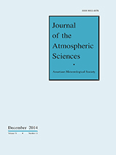
JOURNAL OF THE ATMOSPHERIC SCIENCES
Elevating the Standards of Meteorological ResearchJOURNAL OF THE ATMOSPHERIC SCIENCES, published by the American Meteorological Society, stands as a premier resource for the latest research in atmospheric sciences. With an impressive impact factor and a Q1 ranking in the Atmospheric Science category for 2023, this journal is recognized for its rigorous peer-reviewed articles that contribute to the understanding and advancement of weather, climate, and dynamics of the atmosphere. Established in 1969, the journal has maintained high academic standards and delivers valuable insights spanning over five decades, thus catering to an audience of researchers, professionals, and students alike. Although it does not offer open-access options, it provides critical access through various institutional subscriptions, ensuring that significant research findings are disseminated widely within the scientific community. The journal's address is located at 45 Beacon St, Boston, MA 02108-3693, United States, and it accepts submissions and articles until 2024, continuing its legacy of excellence in atmospheric research.

JOURNAL OF GEOPHYSICAL RESEARCH-ATMOSPHERES
Fostering a deeper understanding of climate and atmosphere.JOURNAL OF GEOPHYSICAL RESEARCH-ATMOSPHERES, published by the American Geophysical Union, is a leading peer-reviewed journal dedicated to advancing our understanding of atmospheric science and related disciplines. With an impressive impact factor and consistently holding a Q1 ranking across key categories including Atmospheric Science and Geophysics, this esteemed journal caters to a global audience of researchers, professionals, and students eager to explore groundbreaking studies and insights. The journal covers a comprehensive scope of topics, from climate dynamics to atmospheric processes, enhancing knowledge and informing practices within the realm of Earth and Planetary Sciences. With its strong emphasis on quality research, it remains a vital resource for those engaged in unraveling the complexities of our planet’s atmosphere. Explore this journal to stay abreast of significant developments and foster a deeper understanding in this ever-evolving field.
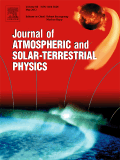
JOURNAL OF ATMOSPHERIC AND SOLAR-TERRESTRIAL PHYSICS
Illuminating the Interactions of Solar and Terrestrial ForcesJournal of Atmospheric and Solar-Terrestrial Physics, published by Pergamon-Elsevier Science Ltd, stands as a pivotal academic resource in the realms of Atmospheric Science, Geophysics, and Space and Planetary Science. With an ISSN of 1364-6826 and an E-ISSN of 1879-1824, this journal encompasses a robust collection of research findings and reviews that address the intricacies of atmospheric processes and solar-terrestrial interactions. The journal has shown consistent academic performance, earning commendable rankings in 2023, including Q3 in Atmospheric Science and Q2 in Geophysics, reflecting its importance for scholarly communication and advancement in these fields. Spanning an impressive convergence of research from 1997 to 2024, it aims to foster interdisciplinary collaboration and inspire innovations among researchers, professionals, and students. Although it currently does not offer open access, the journal is committed to disseminating high-quality content that continues to drive forward our understanding of complex environmental phenomena.
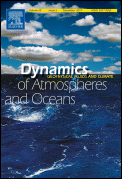
DYNAMICS OF ATMOSPHERES AND OCEANS
Advancing Knowledge in Climate DynamicsDYNAMICS OF ATMOSPHERES AND OCEANS, published by Elsevier, is a renowned journal that has established itself as a vital resource in the fields of atmospheric science, oceanography, and geology. With a rich publication history stretching from 1976 to 2024, this journal provides a platform for high-quality research that addresses the complex interactions between the atmosphere and oceans, which are critical to understanding climate change and environmental systems. It enjoys a respectable impact factor and a reputable position within its category quartiles, specifically noted as Q2 in critical domains such as Computers in Earth Sciences and Oceanography. Researchers and professionals benefit from its indexed coverage, featuring a Scopus ranking that places it among the leading journals in its categories. Although it is not an open-access journal, readers can access its cutting-edge articles through institutional subscriptions or individual purchases. The journal aims to foster cross-disciplinary dialogue and innovation by publishing original research, reviews, and insightful commentary, making it a cornerstone for scholars, students, and practitioners committed to advancing knowledge in the dynamic interplay of Earth's atmospheric and oceanic systems.
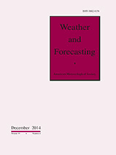
WEATHER AND FORECASTING
Decoding Weather Patterns for a Changing WorldWeather and Forecasting is a premier journal published by the American Meteorological Society, focusing on cutting-edge research in the field of atmospheric science. With its ISSN 0882-8156 and E-ISSN 1520-0434, the journal has distinguished itself within the scientific community, holding a Q1 ranking in Atmospheric Science for 2023 and ranking #56 out of 148 in the Scopus Earth and Planetary Sciences category, demonstrating its influence and high-quality content. Since its inception in 1992, Weather and Forecasting has been dedicated to advancing knowledge in meteorology through rigorous peer-reviewed articles that span a wide range of topics—from numerical weather prediction to climate impacts and atmospheric dynamics. While the journal is not open access, it remains accessible to a broad audience through institutional subscriptions, reinforcing its role as a vital resource for researchers, practitioners, and students alike. With a commitment to excellence in scholarship and a vision towards the future, this journal plays a significant role in shaping the understanding of weather phenomena and forecasting methodologies.